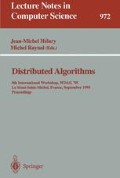Abstract
This paper discusses the relationship between the Non-Blocking Atomic Commitment problem (NB-AC) and the Consensus problem in asynchronous systems with unreliable failure detectors. We first confirm that NB-AC is harder than Consensus. In contrast to Consensus, NB-AC is impossible to solve with unreliable failure detectors even with a single crash failure. We define a weaker problem than NB-AC, called Non-Blocking Weak Atomic Commitment (NB-WAC), which is sufficient to solve for most practical situations. A fundamental characteristic of NB-WAC is its reducibility to Consensus. The previous results on solving Consensus with unreliable failure detectors apply therefore to NB-WAC. An interesting intermediate result of this reducibility is that Uniform Consensus and Consensus are equivalent problems. We show actually that any algorithm that solves Consensus with unreliable failure detectors also solves Uniform Consensus.
Preview
Unable to display preview. Download preview PDF.
References
O. Babaoglu and S. Toueg. Non-Blocking Atomic Commitment. In Distributed Systems, pages 147–166. Sape Mullender ed, ACM Press, 1993.
P.A. Bernstein, V. Hadzilacos, and N. Goodman. Concurrency Control and Recovery in Database Systems. Addison Wesley, 1987.
T. Chandra, V. Hadzilacos and S. Toueg. The Weakest Failure Detector for Solving Consensus. Proceedings of the 11th ACM Symposium on Principles of Distributed Computing, pages 147–158. ACM Press, 1992.
T. Chandra and S. Toueg. Unreliable failure detectors for reliable distributed systems. Technical Report, Department of Computer Science, Cornell Univ, 1994. A preliminary version appeared in the Proceedings of the 10th ACM Symposium on Principles of Distributed Computing, pages 325–340. ACM Press, 1991.
B. Coan and J. Welch. Transaction commit in a realistic timing model. Distributed Computing, pages 87–103. 4(2), 1990.
D. Dolev and R. Strong. A Simple Model For Agreement in Distributed Systems. In Fault-Tolerant Distributed Computing, pages 42–50. B. Simons and A. Spector ed, Springer Verlag (LNCS 448), 1987.
M. Fischer, N. Lynch, and M. Paterson. Impossibility of Distributed Consensus with One Faulty Process. Journal of the ACM, pages 374–382. (32) 1985.
J. Gray. A Comparison of the Byzantine Agreement Problem and the Transaction Commit Problem. In Fault-Tolerant Distributed Computing, pages 10–17. B. Simons and A. Spector ed, Springer Verlag (LNCS 448), 1987.
R. Guerraoui, M. Larrea and A. Schiper. Non-Blocking Atomic Commitment with an Unreliable Failure Detector. To appear in Proceedings of the 14th IEEE Symposium on Reliable Distributed Systems, 1995.
R. Guerraoui and A. Schiper. The Decentralized Non-Blocking Atomic Commitment Protocol. To appear in Proceedings of the 7th IEEE Symposium on Parallel and Distributed Processing, 1995.
R. Guerraoui and A. Schiper. Transaction model vs Virtual Synchrony model: bridging the gap. In Distributed Systems: From Theory to Practice, pages 121–132. K. Birman, F. Mattern and A. Schiper ed, Springer Verlag (LNCS 938), 1995.
V. Hadzilacos. On the relationship between the atomic commitment and consensus problems. In Fault-Tolerant Distributed Computing, pages 201–208. B. Simons and A. Spector ed, Springer Verlag (LNCS 448), 1987.
L. Sabel and K. Marzullo. Election Vs. Consensus in Asynchronous Systems. Technical Report TR95-1488, Cornell Univ, 1995.
A. Schiper and A. Sandoz. Primary Partition “Virtually-synchronous Communication” Harder than Consensus. Proceedings of the 8th International Workshop on Distributed Algorithms, pages 39–52. Springer Verlag (LNCS 857), 1994.
D. Skeen. NonBlocking Commit Protocols. In Proceedings of the A CM SIGMOD International Conference on Management of Data, pages 133–142. ACM Press, 1981.
Author information
Authors and Affiliations
Editor information
Rights and permissions
Copyright information
© 1995 Springer-Verlag Berlin Heidelberg
About this paper
Cite this paper
Guerraoui, R. (1995). Revisiting the relationship between non-blocking atomic commitment and consensus. In: Hélary, JM., Raynal, M. (eds) Distributed Algorithms. WDAG 1995. Lecture Notes in Computer Science, vol 972. Springer, Berlin, Heidelberg. https://doi.org/10.1007/BFb0022140
Download citation
DOI: https://doi.org/10.1007/BFb0022140
Published:
Publisher Name: Springer, Berlin, Heidelberg
Print ISBN: 978-3-540-60274-3
Online ISBN: 978-3-540-44783-2
eBook Packages: Springer Book Archive

